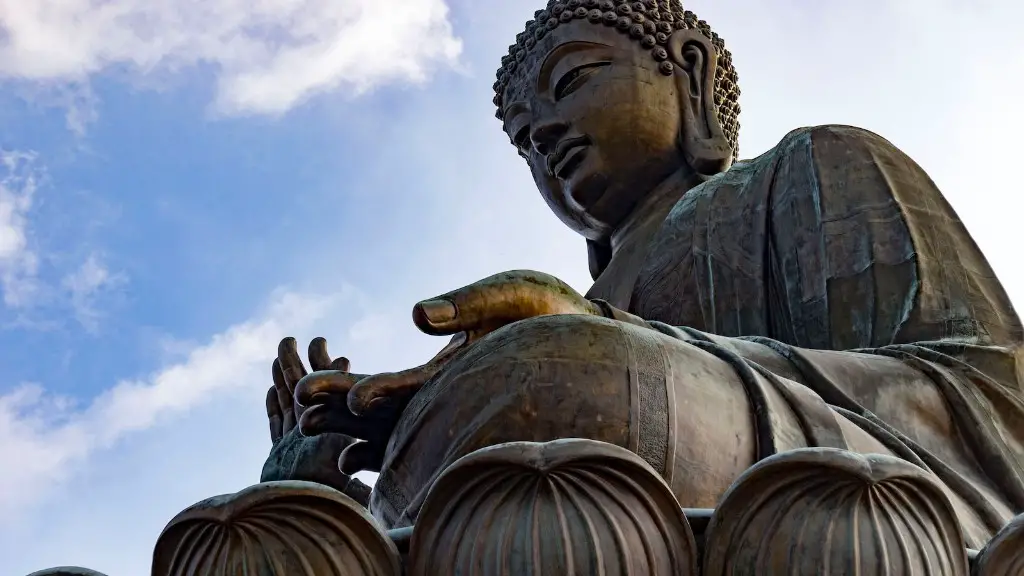Overview
Hinduism is an ancient religion, with millions of adherents around the world. It is a complex integration of various beliefs and practices, which have been evolving over thousands of years. At its core, Hinduism is based on the four basic principles of Dharma, Karma, and Moksha, along with the practice of yoga. These four principles are essential to understand the nature of Hinduism, and the relationship with the divine.
Dharma
Dharma is the principle underlying the cosmic order and is related to the concept of righteousness. Hindus believe that if each individual follows the path of Dharma or righteousness, the world would be in harmony. Dharma is about doing the right thing according the guidelines of the sacred scriptures.
Hindus believe that Dharma changes from one birth to the next, depending on the choices that a person makes. This means that Dharma is not static, but is determined by the individual’s actions and inactions. The primary source of Dharma is the Vedas and other sacred texts which comprise of moral guidelines, practices, and rituals which form the basis of morality.
Karma
Karma is the belief in the law of cause and effect, that actions have consequences. Hindus believe that good deeds result in positive consequences and bad deeds result in negative consequences. Karma is believed to shape and influence the individual’s life and the type of birth they may have in the next life. It is believed that the accumulated effect of all of the individual’s deeds will be reflected in the life of the individual.
Karma is an important aspect of Hinduism, as it can help individuals to understand their current life situation and how to move towards balance and harmony. By understanding the law of karma, one can strive to lead a more righteous and fulfilled life.
Moksha
Moksha is a concept in Hinduism which refers to the liberation of the soul from the material world and its cycle of repeated birth and death. Hindus believe in reincarnation, that is, the soul which is believed to exist in all living things is reborn into a new form. The ultimate goal of life according to Hinduism is to realize and attain moksha or liberation from this cycle of birth and death.
Moksha is a state of liberation and union with the divine and is seen as the ultimate goal of life. Hindus strive for moksha through spiritual practices such as yoga, meditation, and the chanting of mantras which allow the individual to experience a union with the divine.
Yoga
Yoga is an ancient practice which has been practiced by Hindus for thousands of years. It is the practice of postures and breathing exercises which are designed to bring the body and mind into a state of balance. It is believed that yoga helps to bring harmony to the individual and liberate the soul from the cycle of birth and death.
Yoga helps to unify the body, mind and spirit and bring harmony to the individual. The physical postures help to strengthen and align the body and bring energy and vitality. The breathing techniques help to bring balance and clarity to the mind, while the meditation brings calmness and serenity to the spirit.
Importance of Rituals
Rituals are an important aspect of Hinduism and are performed to express devotion to the divine. Rituals provide a spiritual connection with the divine and bring a sense of peace and balance to the individual. The most common Hindu rituals include performing puja (devotional worship), offering charity, and observing fasts, among others. These rituals are believed to bring good fortune, peace, and harmony to the individual and to the world around them, and as such, Hindus strive to perform them regularly.
Scriptural Study
Scriptural Study is an important aspect of Hinduism and enables adherents to gain insights into the divine. Sacred texts like the Vedas, Upanishads, and the Bhagavad Gita are seen as source of knowledge, wisdom, and spiritual guidance. Reading and studying these scriptures enables the individual to gain a deeper understanding of the divine and the processes of the universe. It can also help to bring clarity and peace to one’s mind and to inspire the individual to live a more meaningful life.
Temples, Pilgrimages and Festivals
Temples, pilgrimages and festivals are important aspects of Hinduism. Temples provide a space for the individual to commune with the divine, to pay homage to the gods, and to receive spiritual and divine guidance. Pilgrimages are a way of making spiritual journeys and connecting to divine energies, while festivals are a way of celebrating the sacred.
Festivals are an important aspect of Hinduism, as they provide a time of joy and celebration, while also enabling individuals to connect to the divine. These festivals can range from major annual festivals like Diwali and Holi, to small local festivals which celebrate the divine in its many forms.
Purpose of Life
The ultimate purpose and goal of life according to Hinduism is to attain Moksha or union with the divine. Hindus strive to lead a life filled with moral righteousness, and to perform spiritual practices such as yoga, meditation, and chanting of mantras, in order to reach a higher level of spiritual and divine realization. The ultimate aim of life is to rise above the material, to find inner harmony and peace, and to ultimately, liberate the soul from the cycle of birth and death.
Parental Responsibilities
Hinduism places a lot of importance on the role of parents in a child’s life. Parents are seen as being responsible for guiding the child towards the right path, both morally and spiritually. The parents have a responsibility to nurture and guide the child and lead by example. Hindu scriptures emphasize the importance of good moral upbringing and a strong spiritual connection with the divine. The parents should strive to instill good values in their children and to cultivate the right attitude and mindset.
Daily Practices
In Hinduism, there are many daily practices a person can perform in order to become closer to the divine. Such daily practices include rituals such as praying and meditating, performing charitable acts, chanting of mantras, and engaging in yoga practices. These daily practices help to bring balance and harmony to the individual, to strengthen their spiritual bond with the divine, and to cultivate a peaceful and meaningful life.
Identifying With the Divine
Hindus strive to identify with the divine in order to experience peace, harmony and fulfillment. Hindus believe that everyone is a part of divinity and that the individual is part of a larger, divine whole. Hindus strive to experience union with the divine through spiritual practices such as yoga and meditation. This enables individuals to experience a deeper understanding of the divine and to feel more connected to the universe as a whole.


